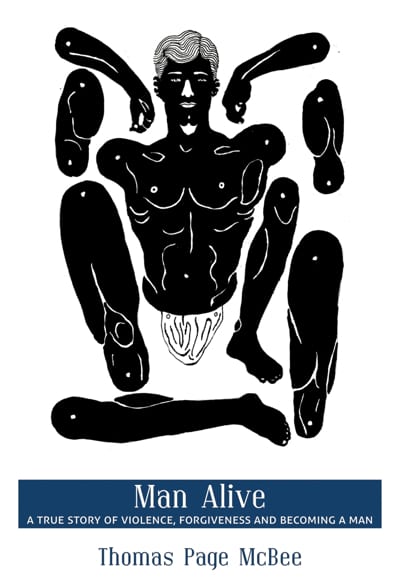by Laura Robledo —
 What does it mean to be a man? This is the question writer Thomas Page McBee poses in his memoir Man Alive, the latest release from the Sister Spit series published by City Lights. For those of you unfamiliar with this series, Sister Spit is a collection of writing from emerging writers and artists highlighting gender and other cultural topics.
What does it mean to be a man? This is the question writer Thomas Page McBee poses in his memoir Man Alive, the latest release from the Sister Spit series published by City Lights. For those of you unfamiliar with this series, Sister Spit is a collection of writing from emerging writers and artists highlighting gender and other cultural topics.
Transitioning back and forth between memories of his childhood in Pittsburgh, Pennsylvania and living in Oakland, California as an adult, McBee draws the reader in from page one with his tender prose, as he searches for the answer to his question of what it means to be a man. Throughout this search, McBee focuses on two male figures in particular: his abusive father, and an anonymous man who mugged him one late evening in Oakland. (McBee’s 172 page book is a dark and heavy read at times.) McBee opens with a scene of his girlfriend discussing the definition of what it means to be a man today, then immediately switches in the next chapter to a time when his mother sat him down at the table as a young child and implored him to open up about his abusive father. From there we move onto other charged scenes from McBee’s life, such as the moment he is held up at gunpoint, and the time he meets his father at a cafe for the first time in twenty years. These are raw memories that draw the reader in to feel the fear and anxiety that McBee himself feels in these moments.
Despite such emotionally charged material, which could have made this book little more than a vehicle for formless anger and revengeful desires, McBee’s writing style takes this book in an entirely different direction—a testament to how talented a writer McBee is. Each word and sentence is crafted with tender, sweet emotion. His prose is clean and concise. He is able to evoke emotion in paltry few words. The writing style itself exemplifies what Man Alive is about: finding beauty, love, and self-acceptance in even the most traumatic experiences.
The backdrop of McBee’s story is his transition into a man, as he becomes Thomas, which is the name he picks for himself. He voices his anxiety over taking testosterone shots, and how these will change his life and his relationship with his girlfriend Parker; these moments are honest and are likely to connect particularly with transgender readers. While not every reader will be able to personally relate to the transgender themes of the book, McBee’s skill comes through in how he connects this part of the story to more universal themes of personal journey and self-discovery. At one point McBee writes: “our stories intersect and some of them intertwine but I couldn’t be responsible for any but my own.” Yes, perhaps this book is categorized as a transgender piece, but we are all constructing ourselves, and Man Alive has the power to draw in any reader on a search for self-identity, who is trying to learn to accept both the bad and good experiences of life.
McBee breaks the book into parts: Freeze, Flight, Fight, Rites and Man Alive. In each section, McBee focuses on a new step in his discovery of what it means to be a man and what that means for his own life. Throughout he uses the metaphor of inertia—for instance, Newton’s maxim that “once a body is in motion, it stays in motion”— and despite being shopworn, these phrases capture the emotion behind McBee’s journey of peeling away his haunted childhood memories and discovering a vibrant life of self-acceptance and love.
Man Alive deserves wide attention. It’s an inspiring, raw tale of a man searching for an identity. McBee is a truly talented writer, one whom readers should continue to look out for well into the future.
 Laura Robledo is a first-year MFA in Writing student at USF. California born and raised, she loves to run, hike, listen to NPR and explore the vibrant city of San Francisco. As much as she enjoys soaking up the sun outdoors, you can often find her at a café writing short stories.
Laura Robledo is a first-year MFA in Writing student at USF. California born and raised, she loves to run, hike, listen to NPR and explore the vibrant city of San Francisco. As much as she enjoys soaking up the sun outdoors, you can often find her at a café writing short stories.